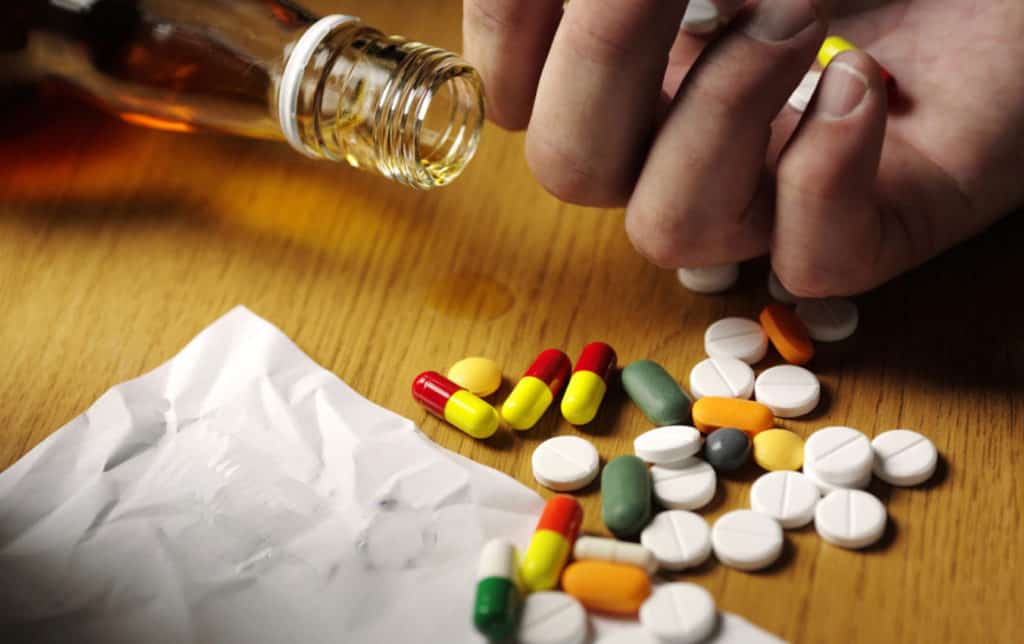Mixing Anxiety Meds and Alcohol
Drug interactions are a significant public health topic. That is because mixing certain drugs and substances can be harmful, even leading to substance use disorder. Unfortunately, many people are unaware of the risks and dangers of such combinations. Antidepressants are the most common anxiety medication prescribed by doctors [1]. They are believed to work by increasing specific neurotransmitters like serotonin in the brain. Serotonin levels affect how a person feels. Alcohol and anxiety meds are hazardous when combined. Problem drinkers were 1.5 times more likely to drink and use anxiety meds. Interestingly, problem drinking among women is linked with anxiety meds use.
Many prescription drugs from different classes, such as antidepressants or benzodiazepines, treat various anxiety disorders. Side effects like drowsiness, impaired driving, and respiratory depression (slowed breathing) can worsen when alcohol and anxiety meds are mixed. Many medicines for anxiety should be used short-term and, in general, you should avoid or limit alcohol with these drugs.
Antidepressants typically include SSRIs (selective serotonin reuptake inhibitors), SNRIs (serotonin and norepinephrine reuptake inhibitors), and tricyclic antidepressants. Lexapro, Paxil, Zoloft, and Celexa are brand names of SSRIs prescribed to treat chronic anxiety. Effexor and Cymbalta are SNRI brand names. SNRIs work to slow the breakdown of the brain chemicals serotonin and noradrenaline. In tricyclic antidepressants, the primary working mechanism is a three-ring chemical structure.
Can You Drink on Anxiety Meds?
After taking a prescription drug to address diagnosable anxiety, many individuals casually chase it with alcohol. They never think about the critical question of “can you drink alcohol while on anxiety meds?” Does alcohol help anxiety? In the short term, alcohol may help dull anxious feelings and thoughts. That’s because alcohol is a depressant.
The use of alcohol may slow down racing thoughts and makes worries seem less urgent [2]. However, it does nothing to eliminate the source of the anxiety, and once the effects of the alcohol dissipate, the anxiety returns with a more evident impact. Some individuals who repeatedly consume alcohol to help cope with anxiety experience more anxiety when they know that the effects of the alcohol are wearing off.

How Does Alcohol Affect Anxiety?
Research shows that alcohol tends to worsen existing symptoms of anxiety. That’s because alcohol changes serotonin levels and other brain chemicals (neurotransmitters). Once the effects of the alcohol begin to wear off, and the blood alcohol content (BAC) drops, an individual’s anxiety can start to increase because they feel more anxious than before drinking.
This state of alcohol-induced anxiety sometimes called “hangxiety” can persist from several hours to a whole day following drinking. Thus, alcohol can either increase or cause anxiety during alcohol withdrawal from the body and within the period that the person is drinking.
Get Help. Get Better. Get Your Life Back.
Searching for Accredited Drug and Alcohol Rehab Centers Near You?
Even if you have failed previously and relapsed, or are in the middle of a difficult crisis, we stand ready to support you. Our trusted behavioral health specialists will not give up on you. When you feel ready or just want someone to speak to about therapy alternatives to change your life call us. Even if we cannot assist you, we will lead you to wherever you can get support. There is no obligation. Call our hotline today.
(844) 597-1011Alcohol and Ativan
The cumulative effects of Ativan abuse can cause health problems. It can have an impact on a person’s memory. Ativan can be habit-forming so using it as long-term treatment isn’t advised. Ativan is one of the more challenging anxiety meds to withdraw from. Taking this benzodiazepine for long periods is especially risky, potentially causing Ativan addiction.
Those with alcohol or substance abuse problems, should not be prescribed Ativan. It can cause serious health problems, which include falling into a coma or death. People taking Ativan for long periods say it gets less effective over time. This can cause people to abuse the drug to obtain benefits.
Ativan comes with side effects such as
- Temporary drowsiness, dizziness, and confusion
- Physical and mental exhaustion
- Temporary drowsiness, dizziness, and confusion
- Physical and mental exhaustion
Serious Ativan Side Effects
Serious Ativan side effects can put people at risk. If a person experiences the following, they should call their doctor immediately:
- They become confused
- As benzodiazepines are a depressant to the CNS, they may become depressed
- The depressive feelings can lead to thoughts of suicide or hurting oneself
- They may experience hyperactivity
- They may become agitated which can turn to hostility
- They may experience hallucinations
- They may become light-headed which can lead to fainting
Because alcohol and anxiety meds like Ativan have similar effects on the body and brain, taking both within the same timeframe can heighten those side effects, sometimes with deadly consequences. Alcohol and anxiety meds like Ativan inhibit the central nervous system (CNS) and can lower heart rate and breathing. The two combined effects can be greater than if they were consumed alone. The combination can cause severe drowsiness, breathing problems, coma, and death
Alcohol and Trazodone
Trazodone is an FDA-approved antidepressant for treating major depressive disorders. Trazodone has a possibility for physical dependence when consumed with alcohol. In addition to that, the deadly combination of Trazodone and alcohol can lead to delirium, hallucinations, and seizures in extreme cases. Mixing Trazodone and alcohol can lead to severe side effects that affect a person’s overall health.
As mentioned earlier, Trazodone can amplify the effects of alcohol. Since both agents are central nervous system depressants, taking them together can be risky due to additive side effects from their drug interactions, which include:
- Dizziness
- Increased intoxication
- Drowsiness
- Confusion
- Fainting
- Difficulty concentrating
- Impairment in thinking and judgment
- Dramatic mood swings
- Increased depression or anxiety

Alcohol and Valium
While some users mix Valium with alcohol or other drugs to intensify their calming effects, others take Valium with other substances without being aware that they endanger their health and safety. Although Valium is safe for most adult users when prescribed under a doctor’s supervision, abusing this medication by mixing it with other medicines, illicit drugs, or alcohol poses serious risks. To prevent excessive sedation, it is critically important to be aware of the possible interactions of Valium with other chemicals. Mixing Valium with alcohol or other drugs can lead to:
- Confusion
- Disorientation
- Accidents
- Sedation
- Stumbling
- Dizziness
- Liver damage
- Nausea
- Loss of consciousness
- Addiction
- Brain damage
- Coma
- Death
Mixing Xanax and Alcohol
Taking alcohol and anxiety meds such as Xanax together will intensify the effects of both substances. Researchers haven’t been able to understand why this happens. However, it’s likely due to chemical interactions between alcohol and anxiety meds like Xanax in our bodies. A study on animals released in 2018 suggested that ethanol, the main ingredient in an alcoholic drink, might increase the maximum concentration of Xanax in the bloodstream. This can lead to an “enhanced” high, as well as enhanced side effects. It also pushes the liver to work harder and break down Xanax and alcohol in the body.
Both alcohol and anxiety meds like Xanax have individual sets of side effects that impact an individual’s behavior and mental state. Because of this, the two should never be used together as they can cause life-threatening effects. When used with alcohol, the introduction of Xanax to one’s body can cause one’s heart to stop beating, hamper neural activity, or slow your breathing to the point of respiratory failure, permanent brain injury, coma, or death.
Combining alcohol and anxiety meds like Xanax also increases the likelihood of a Xanax overdose, leading to respiratory depression, seizures, and potentially even death. An abundance of alcohol and anxiety meds like Xanax can relax and slow body functions to the point that the user’s heart stops beating or they stop breathing, resulting in a coma or death.

Get Your Life Back
Find Hope & Recovery. Get Safe Comfortable Detox, Addiction Rehab & Dual Diagnosis High-Quality Care.
Hotline(844) 597-1011
Are there any anxiety medications that aren’t affected by alcohol?
The short answer is all anxiety meds are affected by alcohol. Alcohol carries many serious risks for people with anxiety, especially if they drink to help cope with their condition. Drinking alcohol with anxiety medications, like alprazolam (Xanax) and lorazepam (Ativan), can worsen side effects from the medication, such as extreme sleepiness, difficulty concentrating and slowed breathing. These side effects can lead to serious and sometimes fatal consequences, including accidental injuries.
It’s important to remember that all medicines have a risk for side effects, especially medications that affect brain chemistry. In addition, everyone has different needs, different brains, and even different chemical imbalances that may lead to anxiety. That’s why you should never take any medicine without your doctor’s approval and supervision. Anxiety medications are not a cure. It is helpful to consider non-medicine treatments, like therapy and self-help, so you can eventually wean off the medication.
SSRIs and Alcohol: A Volatile Combination
Anxiety meds, like Prozac, Paxil, Celexa, and Zoloft, known as selective serotonin uptake inhibitors (SSRIs) are commonly prescribed to patients suffering from anxiety. These drugs work differently than anxiolytics by making the brain’s supply of serotonin more available, thus elevating one’s mood.
Because they work differently in the brain and interact with alcohol differently, while the mechanisms aren’t entirely understood by medical professionals, it has been shown that combining alcohol and anxiety meds like SSRIs can cause memory loss and lower your alcohol tolerance. While it may be true that the combination of alcohol and anxiety meds like SSRIs can feel good in the short term, over time, it can reduce the effectiveness of the medication and increase anxiety levels.
Frequent mixing of alcohol and anxiety meds like SSRIs can also cause people to develop side effects of the drug, such as weight gain insomnia, and nausea. While MOAs are not commonly described for anxiety, it is important to mention that combining these anti-depressive drugs with alcohol can be a life-threatening mix resulting in a dangerous spike in blood pressure which can lead to cardiovascular problems.
Anxiety and Alcohol Consumption
Does alcohol help anxiety? In cases where a person cannot gain a prescription for their anxiety disorder, the doctor may not think it warrants a prescription or wants the client to try other methods to get their anxiety under control. The person suffering may resort to alcohol.
This is also very common among people struggling with an anxiety disorder who either cannot afford therapy or are too embarrassed to seek it. While this may seem like it works initially, in truth, the slight help that alcohol gives is short and temporary, and it comes with a great cost. According to the National Institute of Biotechnology Information (NCBI), alcohol and benzodiazepines generate anxiety, panic, and phobias.
First-class Facilities & Amenities
World-class High-Quality Addiction & Mental Health Rehabilitation Treatment
Rehab Centers TourRenowned Addiction Centers. Serene Private Facilities. Inpatient rehab programs vary.
Addiction Helpline(844) 597-1011Proven recovery success experience, backed by a Team w/ History of:
15+
Years of Unified Experience
100s
5-Star Reviews Across Our Centers
10K
Recovery Success Stories Across Our Network
- Low Patient to Therapist Ratio
- Onsite Medical Detox Center
- Comprehensive Dual-Diagnosis Treatment
- Complimentary Family & Alumni Programs
- Coaching, Recovery & Personal Development Events
Dual Diagnosis Treatment for Alcohol and Anxiety Meds Abuse
There is a strong link between anxiety and alcohol abuse. Individuals who struggle with mood disorders like depression and anxiety are more susceptible to developing an addiction to drugs or alcohol, often to self-medicate symptoms of their underlying mental health condition. These co-occurring disorders can make each other worse without proper treatment.
To determine the most effective ways to treat alcohol and anxiety medication addiction, it’s crucial to get an accurate assessment of all the symptoms. When the symptoms have been evaluated by a mental health professional, it may be determined that another form of mental condition is present and needs a particular type of treatment. Very often, some combination of psychotherapy, medication, and/or lifestyle changes are effective for coping with functional.

Medically-Assisted Detox
Detox is often considered the first stage of treatment. It will help you navigate the complicated withdrawal process, but it doesn’t address patterns of thought and behavior that contribute to drug abuse. Various treatment approaches and settings can help provide the ongoing support necessary to maintain long-term sobriety after you complete detox.
Cravings are very common during detox and can be challenging to overcome. This often leads to relapse. Constant medical care provided during inpatient treatment helps prevent relapse. Clinicians can provide necessary medication and medical expertise to lessen cravings and the effects of withdrawals.
Psychotherapy for Depression and Anxiety
Several different modalities of psychotherapy have been used in the treatment of depression including:
- Cognitive Behavioral Therapy (CBT) – is an effective treatment that involves making changes in both the patterns of negative thoughts and the behavioral routines which are affecting the daily life of the depressed person for various forms of depression.
- Dialectical Behavioral Therapy – is a comprehensive mental health and substance abuse treatment program whose ultimate goal is to aid patients in their efforts to build a life worth living. The main goal of DBT is to help a person develop what is referred to as a “clear mind.”
- Person-Centered Therapy – is a strategy that allows and encourages clients to understand and resolve their concerns in a safe, supportive environment.
- Solution Focused Therapy – is an approach interested in solutions that can be quickly implemented with a simple first step leading to further positive consequences.
Dual Diagnosis Treatment
Substance abuse and mental health disorders often co-occur. In many cases, traumatic experiences can result in a mental health disorder and substance abuse. Dual diagnosis rehabilitation treats both of these issues together. The best approach for the treatment of dual diagnosis is an integrated system. This strategy treats both the substance abuse problem and the mental disorder simultaneously. Regardless of which diagnosis (mental health or substance abuse problem) came first, long-term recovery will depend largely on the treatment for both disorders done by the same team or provider.
Medication-Assisted Treatments
Medication-Assisted Treatments (MAT) for substance use disorders and mental health disorders are commonly used in conjunction with one another. This includes the use of medications and other medical procedures. During your rehab, the staff from your treatment facility will help you identify what caused your addiction and teach you skills that will help you change your behavior patterns and challenge the negative thoughts that led to your addiction. Sometimes, the pressures and problems in your life lead you to rely on substances to help you forget about them momentarily.
Someone with an anxiety meds addiction, for example, Xanax addiction may take up to 20 or 30 pills daily. If the user decides to stop the Xanax dosages, they may experience withdrawal effects such as anxiety, restlessness, insomnia, and tremors. The development of tolerance and withdrawal are indications of addiction. If you or a loved one are struggling with long-term alcohol and anxiety meds addiction and a co-occurring mental health condition such as anxiety and depression, contact one of our helpful treatment specialists today. We Level Up can provide information on dual diagnosis and detox programs that may fit your specific needs.

Experience Transformative Recovery at We Level Up Treatment Centers.
See our authentic success stories. Get inspired. Get the help you deserve.
Start a New Life
Begin with a free call to an addiction & behavioral health treatment advisor. Learn more about our dual-diagnosis programs. The We Level Up Treatment Center Network delivers recovery programs that vary by each treatment facility. Call to learn more.
- Personalized Care
- Caring Accountable Staff
- World-class Amenities
- Licensed & Accredited
- Renowned w/ 100s 5-Star Reviews
We’ll Call You



